Overview
This piece examines the assassination of conservative activist Charlie Kirk, the arrest of Tyler Robinson, and situates this tragic event in the broader historical and systemic context of political violence and gun access in the United States. To be clear: this blog is not about judging Kirk’s political views or critiquing his rhetoric. Nor is it about prescribing what words politicians should use—those debates are for others.
Our central concern is the extraordinary access to lethal weapons in America and its impact on democracy, public safety, and civic participation. Even in a deeply polarized society, democracy can endure—so long as citizens are not under constant threat of deadly force. Limiting firearms does not curtail free expression; it protects it, ensuring that vigorous debate remains survivable.
We will place this incident in historical context, explore comparative international data, analyze the roadblocks to meaningful gun reform, and assess whether there is hope for overcoming them.
What Happened: Acknowledgement of Arrest
On September 12, 2025, authorities confirmed that Tyler James Robinson, 22, was arrested and held without bail on charges including aggravated murder, felony discharge of a firearm causing serious bodily injury, and obstruction of justice in the fatal shooting of Charlie Kirk. Robinson reportedly became more politically engaged in recent years and criticized Kirk’s viewpoints; a tip from a family member or friend followed his confession or implication.
This tragedy underscores a key truth: political disagreements—even sharp, polarized, and heated—should never escalate into lethal outcomes. America can survive political division, but it cannot survive the routine availability of deadly weapons.
Charlie Kirk: Controversial Figure, Revered and Feared
Kirk was a highly visible young leader of the conservative movement, best known through Turning Point USA. His appeal on the right stemmed from both substance and style: debates, public challenges, and the “Prove Me Wrong” format. He framed himself as a warrior against “woke culture” and a defender of traditional American values.
To liberals and progressives, Kirk’s rhetoric was threatening—racist, xenophobic, or conspiratorial. He endorsed the “Great Replacement” theory, dismissed white privilege, and warned of “sexual anarchy” promoted by the left. His sharp rhetoric often drew protests and made his public appearances flashpoints for conflict.
The purpose of recounting these aspects is descriptive, not prescriptive. Even amid such division and vitriol, America can remain a democracy if access to lethal weapons is strictly limited: words can provoke debate, but bullets provoke death.
Violence and American Democracy: A Long Arc
Political violence has shadowed the United States since its founding—from Revolutionary-era duels and riots to legal crackdowns and suppression of dissent. In the early republic, violence enforced restrictions on voting rights for Black citizens and women.
The antebellum period through Reconstruction saw violence directly tied to race and citizenship. White supremacist groups carried out lynchings and massacres to suppress Black political participation. Jim Crow laws institutionalized legal and physical suppression.
The civil rights movement illustrates both the persistence of violence and the resilience of democracy. Marches and nonviolent protests were forged in response to brutal opposition—police beatings, firebombings, assassinations. From Freedom Summer to Selma, the expansion of voting rights was written in both law and blood.
Even today, violence shadows civic life: election workers are threatened, activists harassed, mass shootings and extremist attacks blur the line between criminal acts and political terror. Democracy can survive polarization and harsh rhetoric, but only if citizens are not killed for participating. Limiting lethal weapons preserves this essential condition for freedom.
Guns, Access, and Risk: A Politically Fraught Debate
Any serious conversation about guns must begin by acknowledging that this is one of the most politically fraught debates in America. It is divided not just by policy preference but by culture, identity, and worldview.
For conservatives, firearms are often seen as essential to self-defense, liberty, and a safeguard against government overreach. Many view restrictions as unconstitutional encroachments on Second Amendment rights and fear that any reform is the first step toward broader disarmament.
Liberals, by contrast, tend to prioritize public safety and point to overwhelming evidence that stricter regulations reduce gun deaths. For them, fewer guns mean fewer tragedies, and the refusal to act is viewed as political cowardice in the face of preventable violence.
But here is the request: regardless of how one feels about Charlie Kirk, or about gun rights versus gun reform, suspend those biases for a moment. Consider the data in America and around the world. Ask yourselves: what does our society—even one as polarized as ours—look like with less access to lethal weapons and fewer gun deaths? The answer is not about partisanship. It is about the conditions required for democracy to survive.
Political Violence Since 2000
The United States has endured alarming attacks on political figures: Gabby Giffords in Arizona, Steve Scalise at congressional baseball practice, Paul Pelosi at home, Minnesota legislators Melissa Hortman and John Hoffman, and a 2025 attempt on Donald Trump.
These incidents cut across party lines. What unites them is that violence seeks to silence speech and destabilize democracy. Unlike many other democracies, where attacks are rarer or carried out with non-lethal means, American attacks frequently involve firearms—making them deadlier and harder to prevent.
Democracy can withstand intense partisanship, even vitriol, but not if firearms make that vitriol fatal. Limiting gun access is what preserves political survival.
Guns in America and Abroad: What the Data Shows
The U.S. has the highest level of civilian gun ownership among high-income nations.
The firearm mortality rate in America is also the highest, with firearms as the leading cause of death for children. Many states have firearm death rates rivaling conflict zones.
By contrast, Australia reduced gun violence through licensing, bans, safe storage, and a buyback program after the 1996 Port Arthur massacre. Mass shootings virtually disappeared, firearm deaths declined, and suicides dropped in high-participation regions.
Canada and the UK, with stricter licensing and limits on high-capacity weapons, have lower firearm homicide rates. These comparisons show that curbing lethal weapons is not just a policy choice—it is essential to preserving free, democratic societies. Even amid polarization and sharp rhetoric, democracy thrives where guns are controlled.
Roadblocks to Reform
Meaningful gun reform faces constitutional, political, and cultural barriers: the Second Amendment, Supreme Court interpretations, polarization, identity politics, lobbying by the NRA and gun industry, patchwork state laws, and misinformation.
It often feels hopeless. Many Americans believe nothing will change because of gridlock and political dysfunction. Yet polling tells a different story: there is far more unity around common sense reforms than our politics suggests.
Surveys consistently show that:
- Around 89% of Americans support universal background checks for gun sales.
- 77% support requiring a permit before purchasing a gun.
- Majorities support “red flag” laws that temporarily remove firearms from people deemed dangerous.
Even if political leaders struggle to act, the American people are not as divided as the debate makes it seem.
Responding to “Guns Don’t Kill People, People Kill People”
One of the most common arguments against reform is that guns are not the problem—people are. “Guns don’t kill people, people kill people.” But history shows that when society regulates dangerous tools, deaths decline.
Before widespread seatbelt laws in the 1980s, traffic fatalities were far higher. After laws and enforcement campaigns took hold, traffic deaths fell dramatically. The National Highway Traffic Safety Administration estimates that seatbelts save 15,000 lives each year in the U.S.
For decades, smoking-related illnesses were the leading cause of preventable death. When governments mandated warning labels, restricted advertising, and raised taxes, smoking rates fell. Lung cancer deaths in the U.S. have declined steadily since the 1990s, with the CDC estimating smoking prevalence dropping from 42% in 1965 to 12% in 2020.
The lesson is clear: people may cause harm, but when society addresses the means of that harm—cars without seatbelts, cigarettes, or firearms—lives are saved. To say “people kill people” is to ignore decades of public health evidence.
Is There Hope?
Public support for targeted reforms is high, even among gun owners. States with stronger laws demonstrate reduced violence without violating constitutional rights. International examples like Australia show bold action works.
Cultural change—rejecting violence as a legitimate form of political expression—is equally crucial. Even in a divided, polarized America, citizens can speak, debate, and protest safely if lethal weapons are curtailed. These limits are what make democracy resilient.
Conclusion
The murder of Charlie Kirk is a stark reminder that political violence in the United States is not abstract—it is deadly, and fueled by easy access to firearms. A democracy that allows lethal weapons to be widespread is exposed to existential threats.
American democracy has survived past crises because citizens acted. If democracy is to endure, addressing gun access is not optional—it is essential. Even in the midst of vitriol and political polarization, limiting access to lethal weapons allows freedom to persist.
We resolve to ensure this incident is not another step toward normalizing violence, but a call to protect the fragile promise of democracy, expand rights, and stand together against violence in public life.
Share this message, engage in the conversation, and help OneV protect the fragile promise of democracy.
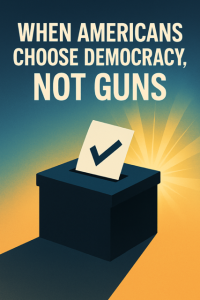
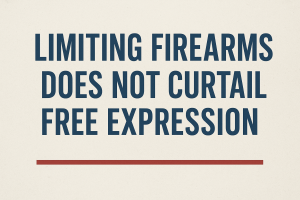
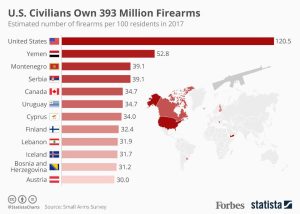
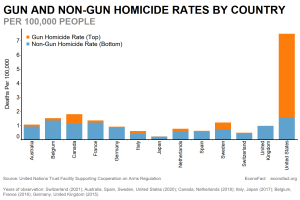
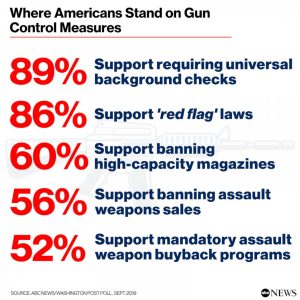
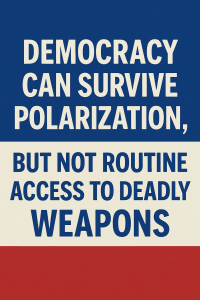
Leave a Reply